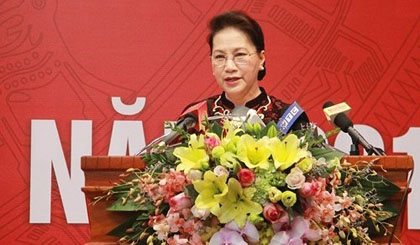State Audit urged to promote its independence
Chairwoman of the National Assembly (NA) Nguyen Thi Kim Ngan has highlighted the need to promote the independence of the State Audit Office of Vietnam (SAV) and auditors, aiming to ensure the transparency of the office’s operations.
 |
| NA Chairwoman Nguyen Thi Kim Ngan speaks at the conference. (Photo: qdnd) |
The top legislator made the statement at a conference held by the SAV in Hanoi on January 15 to deploy its tasks in 2018.
Addressing the event, NA Chairwoman Ngan spoke highly of the significant results obtained by the SAV, which she said, have contributed actively to the corruption and waste prevention and fighting at agencies and units.
The audit office has focused on evaluating macroeconomic issues and auditing pressing issues of the people’s concern, contributing to patching legal loopholes and better serving the administration and management of public finance and public assets, she stated.
The leader asked the SAV to closely follow the Law on State Audit in its operations, promptly make a comprehensive assessment of the Law on State Audit in order to propose the necessary adjustments and supplements, and finalise documents guiding the implementation of the Law on State Audit.
At the conference.
On the occasion, NA Chairwoman Ngan presented the Independence Order, third class to the former State Auditor General Nguyen Huu Van and the Labour Order, second class to State Auditor General Ho Duc Phoc.
As of January 4, 2018, the SAV has detected and suggested VND43.6 trillion (US$1.92 billion) worth of financial prosecutions, including VND32.6 trillion (US$1.43 billion) in increasing State budget revenues and reducing the State budget expenditures, and VND11 trillion (US$484 million) in other prosecutions, up 12.5% against 2016.
Through its audit activities, the office has also proposed the revision and abolition of 96 legal documents, in a move to eliminate legal loopholes and to avoid losses and waste.
(Source: NDO)
 về đầu trang
về đầu trang







